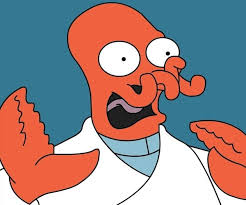Then how is it possible that humanity developed society and technology for millennia by cooperating and being a social species, but all of a sudden human nature is a greedy selfish free for all? Could it be that capitalism rewards and even requires corruption and exploitation?
Do you really believe that greed is a more recent phenomenon and that we’ve survived this long as humanity because we’re a social species that works for the betterment of ourselves?
You clearly didn’t understand the poster. It’s not about greed existing, it’s about the system which explicitly incentivises greed and ruthless extremism in pursuing it. If you reward greed, the most greedy will inevitably come on top of it. What exactly do you expect from a system where competition is the highest virtue?
It is sometimes hard to understand intent over text, which is why I asked for clarification.
I tell them “that’s what the gulags are for”
Unironically
Not really a counter argument but
At least the communist system isn’t designed with exploitation as the explicit objective
“All those people you complain that communists killed, those are the corrupters”
There’s no simple answer. It’s an argument based on a conception of universal ‘human nature’. I reject that conception.
According to the Marxist world outlook, the only thing constant is change (dialectics is the study of change). People tend to accept this idea because it’s obvious when they think about it, although it can be discomfiting. If it helps, you can use the example, “Can you step into the same river twice?”
What is less obvious (because liberalism hides them) are the implications. It can be helpful to focus on a ‘moment’, freezing time for long enough to analyse what you’re looking at. But this is only an analytical trick.
If everything is always changing, then any explanation of anything is only valid for a specific period of time. Before that time, it was something else. After that time it will become something new. Everything is historically contingent.
This applies to ‘human nature’. Of course, a liberal might say, ‘well yes but the change with regard to human nature is that it didn’t exist before humans and won’t exist after humans’ but that’s silly and completely misunderstands things. For a start, it implies that human nature has been the same for 200,000+ years, which is frankly a ridiculous assumption.
The next question is, then: What affects human nature? What influences the idea and the practice of what it means to be human?
According to the Marxist world outlook, the object of study is not so much ‘things’ as it is (internal) relations and processes. (All this wraps around itself: understanding ‘change’ requires you to understand the idea of a ‘process’, for example.)
Human nature is internally related to other social processes. Humans cannot survive in the abstract and cannot survive as a species as individuals. Which means humans don’t exist without society.
The organisation of that society tells you how humans meet their daily needs. Human society is organised to make shelter, harvest and cook food, educate and care for each other, and so on. Although the exact form of organisation changes, to reiterate, there are no humans except humans organised in society.
The way that society is organised for meeting human needs determines how humans interact with one another. Abstract factors that influence the internal relations of humans and society include: the mode of production, means of production, relations of production, forces of production, mental conceptions, technology, geography, urban/rural divisions, agricultural advancement, etc.
If all this is true, then human nature cannot be universal. It must change depending on the kind of society in which humans live. If human nature is not fixed, the fear that humans are naturally corrupt is misconceived.
It’s as simple as this: in capitalism, if you play by the rules and are not corrupt and greedy, there’s a high chance that you will become unemployed, homeless, and eventually starve to death. (You can break the rules and work cooperatively e.g. in a union, but you will be disciplined, attacked, slandered, and penalised for it.) Capitalism requires corruption and greed. It literally cannot exist otherwise, although it uses different labels for them, like ‘competitive’, ‘efficient’, ‘lobbying’.
It doesn’t have to be like this. And it will not be like this under socialism and certainly not like this under communism. Under socialism, greed and corruption will be less useful because essential needs will be met collectively, regardless of how competitive or efficient (or ‘connected’ to the right people) anybody is. Those who insist can be disciplined, attacked, slandered, and penalised for it, just like those who work collectively under capitalism.
At the same time, ‘the ruling ideas of the epoch are the ideas of the ruling class’. This phrase will apply when the workers are the ruling class just as much as now, where the capitalists are the ruling class. In a society that consciously organises itself collectively, the ruling ideas (shared in culture, literature, film, water-cooler conversations, etc) will not be of greed and corruption because these practices will not bring the same advantages as they do under capitalism: the new social relations will begin to render them obsolete.
In sum, I politely tell the other person they don’t know wtf they’re talking about. Or I tell them that I’m uninterested in idealist or metaphysical world outlooks. If that would result in a ‘debate’ or argument, I probably just let them be. I won’t learn much from anyone that doesn’t understand or at least accept the premise of historical materialism and if they see it as an argument, as if the broad brush strokes are open to dispute, they aren’t interested in learning from me. So I only say anything like this with those who are open to listening and learning.
This is great!
This is the best answer here. Solidly rooted in ML theory.
If corruption is bad, why is it the driving force and motive of our entire economic system? Seems like an incentive structure far more ripe for abuse than some hypothetical non-blood-fueled system. Real “remove the beam from thine own eye” type deal
It is just a defeatist argument, basically the same as saying, “Well we all die anyway, so why worry about our health?”. Sure, corruption is possible as with we saw happen with the Warsaw pact, but a socialist state being corrupt just simply means that is operating closer along the lines capitalism. By asking for capitalism, you are just giving up and settling for the worst.
If you skip past most of this please read the last paragraph.
First point to make “will corrupt it the same way they do for capitalism”
People that actually say this are already in the wrong. They look at places like the US and see the politicians not working for the people. Getting into bed with big business money and screwing over the rest of the population… The rest of the population being the workers, the labor forces… The US is a capitalist government… This is not corruption. Corruption doesn’t not mean “evil” or “bad,” it means “doing something that goes against what the current system is set up to do.” The way we use “corruption” in the US is actually the system working as intended. The government is SUPPOSED to do this. They are SUPPOSED to uphold the power of the capitalist at the expense of the people. Protecting and serving the capitalist class has always been the governments purpose. They have just spend centuries convincing the populace when it’s not. That the government is there to protect and serve all Americans. A real, actual corrupt politician in the US is one that would help the workers at the expense of businesses. In the same light a politician that uses his office to further their own wealth is not corrupt in the eyes of capitalism. That’s a very capitalist thing to do. Further your own accumulation of capital at the expense of the working class.
You notice these politicians never further their own wealth if it is going to hurt the oligarchy in any meaningful way, and the ones that do are cast out almost immediately. So the US DOES weed out corruption. It’s why you don’t see many politicians in the US actually helping the working class or going against the oligarchy. You think the US didn’t do mass purges? Look at what they did to crush the communist parties that had so much support their marches filled the streets of cities during and after the great depression.
The irony is that by doing this they create a definition of corruption in politics that is only really applicable to socialist nations. A socialist working with businesses at the expense of workers IS actual corruption. A socialist politician that uses their position for personal gains etc. Is corruption. That’s NOT how the system is intended to work. So the definition applies.
The other thing that no one ever seems to think about or bring up is this.
Ok so let’s say both systems get “corrupted” right? What happens when the corrupt get into power? Do the all of a sudden become “less corrupt”? Do the go “ok I’m in now but here where it stops” or do they FURTHER the corruption of the system? Anyone with a miniscule amount of brain activity will say they do the latter. A corrupted system furthers its own corruption. To make it safe for them who are corrupt. So then you have to point out… a “corrupt” capitalist system as they define it… never really changes. It never stops being capitalist. If history has shown us anything,it’s that when a SOCIALIST nation gets to a certain point in it’s corruptuon what happens? It BECOMES capitalist… It stops serving the people and begins serving capitol. The fall of the USSR is a perfect example. By this reasoning one can say that with “corruption” as they define it, there is no socialist country to ever exist that is more corrupt than a capitalist one. Because corrupt socialism devolves into capitalism as it becomes more corrupt. Capitalism is the system in which the corrupt create to be safe and maintain their power and wealth. It does not devolve into anything because it’s already at its final level. One could say " but Fascism" but fascism isn’t an entirely different system. It still runs on capitalism.
This is far from a complete answer, but it might at least get past that initial objection, if they’re willing to listen to you.
Under capitalism, the unscrupulous do not take advantage of the system, they take advantage of people who have little room to object because the system purposely denies them self-determination. A poor individual who tries to escape their exploitation risks homelessness and starvation, while the exploiter who fails is usually free to try again.
Under a system that protects everyone, however, the unscrupulous lack leverage over others, who can safely refuse to go along with their schemes. Without the imbalance of power, corruption is made inherently more difficult.
If you’re prepared to also discuss prison abolition, etc., you might also add that, beyond that, societies already have mechanisms for protecting themselves in the form of laws and consequences for crimes. Each society’s responses may be different, and need not be as inhumane as those we’re familiar with now, and so on.
“You’re gonna shit, why ever wipe your ass?”
I just flip these stupid arguements on their head. There is no amount of logic that makes this make sense. Ask them this…if they think communism wouldn’t work because “muh human nature” (which isn’t even true, humans have only made it this far by banding together), then why does it make sense to keep the system that feeds into humanity’s worst impulses?
I’d point to the people in China awaiting execution or already executed for corruption.
You do that in the west you get a slap on the wrist fine, at absolute most if you’re like Jack Abramoff you go to prison for a few years.
Seriously, I can’t even name one US billionaire that I know of off the top of my head that has ever received any sort of proper punishment from the government. They just pay measly fines and go about their business lol.
I’d have them watch a little educational film about how all types of systems of government and/or organization of the economy are at risk for corruption and despotism.
https://www.britannica.com/video/213840/Encyclopaedia-Britannica-Films-Despotism-1946
The only safeguards are an educated and aware population.
Capitalism, however, incentivizes greed, and thus is at higher risk for corruption and despotism due to that.
What “communist” nation has ever not had a central authority figure who lives in a gilded palace and lords it over their subjects and bombards them with propaganda?
“Well put those greedy fucks up against the wall”
Is it a good argument? no
We’re they trying to have an actual conversation? Also no
"Well it’s better to have a system that attempts to prevent that instead of allowing those corrupt people to run the world as policy. "
The first time I tried to make rice on the stove, I burned the shit out of it. The next time I tried to make rice on the stove it boiled over uncontrollably, making a huge mess.
I now cook rice on the stove like a fucking boss.
Keep trying to do the good thing until you get it right.










